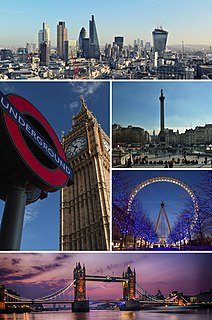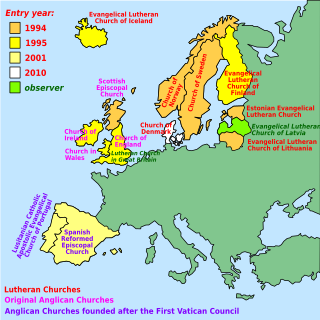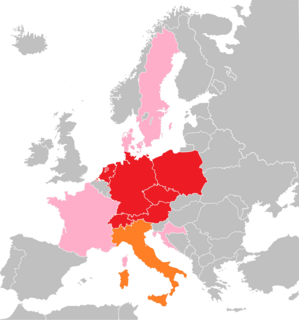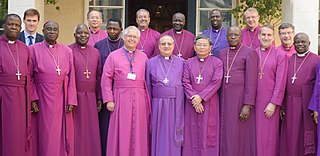The first Pan-Anglican Congress was held in London (United Kingdom) from June 15 to June 24, 1908, immediately prior to the Fifth Lambeth Conference held in July of the same year. Designed as a consultation on mission, the Congress was a meeting of some 17,000 people attended both by clergy and laity. [1]

London is the capital and largest city of both England and the United Kingdom. Standing on the River Thames in the south-east of England, at the head of its 50-mile (80 km) estuary leading to the North Sea, London has been a major settlement for two millennia. Londinium was founded by the Romans. The City of London, London's ancient core − an area of just 1.12 square miles (2.9 km2) and colloquially known as the Square Mile − retains boundaries that follow closely its medieval limits. The City of Westminster is also an Inner London borough holding city status. Greater London is governed by the Mayor of London and the London Assembly.

The United Kingdom (UK), officially the United Kingdom of Great Britain and Northern Ireland, and sometimes referred to as Britain, is a sovereign country located off the north-western coast of the European mainland. The United Kingdom includes the island of Great Britain, the north-eastern part of the island of Ireland, and many smaller islands. Northern Ireland is the only part of the United Kingdom that shares a land border with another sovereign state, the Republic of Ireland. Apart from this land border, the United Kingdom is surrounded by the Atlantic Ocean, with the North Sea to the east, the English Channel to the south and the Celtic Sea to the south-west, giving it the 12th-longest coastline in the world. The Irish Sea lies between Great Britain and Ireland. With an area of 242,500 square kilometres (93,600 sq mi), the United Kingdom is the 78th-largest sovereign state in the world. It is also the 22nd-most populous country, with an estimated 66.0 million inhabitants in 2017.

Clergy are formal leaders within established religions. Their roles and functions vary in different religious traditions, but usually involve presiding over specific rituals and teaching their religion's doctrines and practices. Some of the terms used for individual clergy are clergyman, clergywoman, and churchman. Less common terms are churchwoman and clergyperson, while cleric and clerk in holy orders both have a long history but are rarely used.
The Congress was initiated by Bishop Henry H. Montgomery, Secretary of the SPG. Principal meetings were held at the Royal Albert Hall in South Kensington. [2]
The Rt Rev. Henry Hutchinson Montgomery, KCMG, was an Anglican bishop and author in the last part of the 19th century and the very start of the 20th.

The Royal Albert Hall is a concert hall on the northern edge of South Kensington, London, and is one of the UK's most treasured and distinctive buildings. The Hall is a registered charity held in trust for the nation, and receives no public or government funding. It can seat 5,267.

South Kensington is an affluent district of West London in the Royal Borough of Kensington and Chelsea. With some of its easterly areas shared with the City of Westminster, the district is known as a popular tourist destination due to its density of museums and cultural landmarks.
The Congress marked a period of organizational transition for Anglican church mission work and a growing recognition of the cultural diversity, organizational autonomy, but interlinked character of member churches of the Anglican Communion. [3]

The Anglican Communion is the third largest Christian communion. Founded in 1867 in London, England, the communion currently has 85 million members within the Church of England and other national and regional churches in full communion. The traditional origins of Anglican doctrines are summarised in the Thirty-nine Articles (1571). The Archbishop of Canterbury in England acts as a focus of unity, recognised as primus inter pares, but does not exercise authority in Anglican provinces outside of the Church of England.









